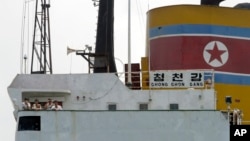A U.N. Security Council committee on Monday blacklisted the operator of a North Korean ship, which was seized near the Panama Canal last year for smuggling Soviet-era arms, and raised concerns about Cuba's military cooperation with Pyongyang.
The North Korea (DPRK) sanctions committee designated Ocean Maritime Management, which operated the Chong Chon Gang, the ship detained a year ago carrying arms, including two MiG-21 jet fighters, under thousands of tons of sugar.
The company is now subject to an international asset freeze and travel ban.
North Korea is under an array of United Nations and U.S. and other countries' sanctions for nuclear and ballistic missile tests since 2006 in defiance of global demands to stop.
“Ocean Maritime Management Company, Ltd (OMM), played a key role in arranging the shipment of the concealed cargo of arms and related materiel,” the committee said in an implementation assistance notice.
“The concealment of the aforementioned items demonstrates intent to evade U.N. sanctions, and is consistent with previous attempts by the DPRK to transfer arms and related materiel through similar tactics in contravention of Security Council prohibitions,” the committee said.
Cuba's response
After the weapons were discovered on the Chong Chon Gang, Cuba acknowledged it was sending “obsolete” Soviet-era weapons to be repaired in North Korea and then returned to Cuba.
U.S. ambassador to the United Nations, Samantha Power, described the Chong Chon Gang incident as “a cynical, outrageous and illegal attempt by Cuba and North Korea to circumvent United Nations sanctions.”
She said the Security Council committee had “uncovered irrefutable facts that clearly prove Cuba and the DPRK's intentions to violate sanctions by employing highly sophisticated deception and obfuscation techniques.”
Powers said that imposing a global asset freeze on Ocean Maritime Management means that the company, which is headquartered in Pyongyang, will no longer be able to operate internationally.
A U.N. report issued in March said North Korea has developed sophisticated ways to circumvent United Nations sanctions, including the suspected use of its embassies abroad to facilitate an illegal trade in weapons.
The Security Council committee said on Monday that investigation found indications that North Korean officials in Havana helped make arrangements for the Chong Chon Gang shipment.
“The committee encourages states to continue to exercise enhanced vigilance over DPRK diplomatic personnel,” it said.
Concerned by cooperation
The committee said it was concerned the military cooperation between Cuba and North Korea violated U.N. resolutions, which “prohibit the transfer from the DPRK by its nationals or from its territory of advice, services or assistance related to the maintenance or use of prohibited arms and related materiel.”
“This prohibition covers many activities including repair, diagnosis, monitoring, physical and chemical tests, and any related services for such items,” the committee said.
A Panamanian court on Friday ordered the release of the Chong Chon Gang's three North Korean officers. Thirty-two North Korean sailors and the ship were released by Panama in February.
Some information for this report provided by AP.





